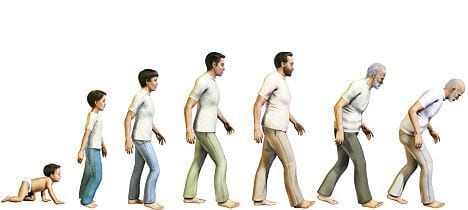 In Shakespeare’s play “As You Like It” one character Jaques makes a speech describes ‘the seven ages of man’.
In Shakespeare’s play “As You Like It” one character Jaques makes a speech describes ‘the seven ages of man’.
These are:
Infancy – being a helpless baby, feeling and feeding, dependent.
Childhood – all about playing, talking, learning and becoming independent.
Teenage – finding identity, forming views, experiencing disconcerting change, testing boundaries, being impatient
Young adult – passionate, powerful, forming depth and direction in work, love and independent home. Finding possibility in fearless ways.
Middle-age – enjoying experience and status, having a defined place in the world. Having well-formed views, expecting to be listened to, enjoying maximum resources, but still holding significant commitments.
Old age – senior in years, with great memory but less energy and drive to achieve even though this is still desired. Having less influence and being more dependent.
Dotage and death – dependence becomes the main thing alongside letting go or the senses and experience of life.
These are brief descriptions of the stages of life that just give you a flavour, or are experiences and expectations through living.
You can find the full speech here.
It strikes me that in a family, or community, we will include people at all these seven stages of life. Extended families and neighbourhoods are at their best when every stage of life is appreciated, and cared for. Back in 2011, we had a teaching series on what is means to find and follow Jesus Christ at different stages of life.
If every stage of life is natural and to be embraced it seems foolish to favour one stage of life over and other and not misunderstand people at one stage so as not allowing them to be themselves.
In society, we may be obsessed with teenagers and young adults in some arts and the media. In politics, we may neglect that same group because they lack a vote. We may also be inclined to pretend that we are at a stage of life which we haven’t yet reached or have passed long ago. It is time for some to stop wearing those tight jeans! It goes without saying that we fear and so hide the final stage of dotage / death.
It seems to me that now is the time to let people be the ages they are and to nurture them at that age. I believe that it is time to appreciate and speak well of each age and not favour one stage of life over another.
Applying this in another sphere, I think that we have individual churches at these seven stages of life. I would go further and say that it is good and natural to have churches at every age. We need child, teenage and young adult churches – but we should not obsess about such youthful churches to imply that they have everything. We need middle aged and older churches which offer so much but should not be taken for granted but nor hold onto all the strings of power and resource. We need to honour dotage churches as they let go.
I celebrate all growth and commitment to church planting and pioneer expressions of church. They are part of our tapestry and vibrancy of Christian community. But in championing them let us value the established and traditional. I hope that we can speak better and in a more informed way of the different ages of church, so that all belong and are celebrated. There is also much to be done understanding what each age of church needs and doesn’t need. For instance, let teenage and young adult churches explore and form identity but don’t burden them with too much institutional responsibility. Don’t take middle aged or older church for granted and assume they have nothing to offer – otherwise they will misuse their influence and try to hold it too tightly. Beware of the twin mistakes of neglecting or offering limitless resource to dotage church.
I have a sneaking feeling that we could understand more fully the ages of human life and church. I have a growing conviction that we need to speak better of one another at our different ages of life (human and church). I am sure that Christ holds and cares of every stage of life, even as the young shall have vision, and the old dream!
At the end of this, I realise that I have betrayed my stage of life. Who else would write 750 words and expect others to stop, read and take notice. Yes at 55 I am enjoying middle age with gusto.
Graham Brownlee, February 2017

